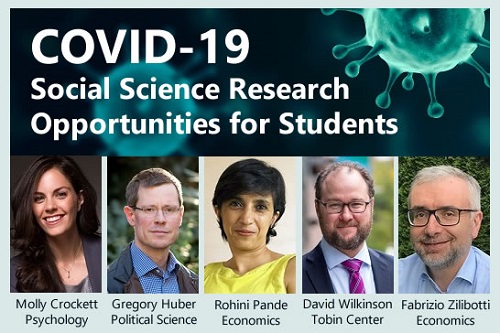A Social Science Response to COVID-19: Research Opportunities for Students to Help with the Public Health Crisis

In the last five months, a novel coronavirus pandemic has created a public health crisis with enormous consequences for health, politics, and economics. It has created political and economic challenges in every country and raised important questions about how societies respond to the threat: how to design effective policy responses, the ethical questions of policy enforcement, measuring and mitigating the economic damage of lockdowns, how the crisis deepens existing inequality and social divides, designing effective public health messaging, and monitoring how government power and democratic norms are affected by a public health crisis.
As we face the next several months and possibly years of the pandemic’s damages and challenges, Yale’s faculty in the Faculty of Arts and Sciences, Division of Social Science, are pursuing research projects that tackle some of these issues.
On May 7, FAS, ISPS, and the Tobin Center hosted a Zoom meeting moderated by Alan Gerber, Dean of FAS and incoming Director of ISPS. The meeting, “COVID-19 Social Science Research Opportunities for Students,” featured the work of five faculty members and called on Yale students interested in COVID-related social science questions to work with Yale professors on their research projects.
Over 200 students, both graduate and undergraduate, attended the virtual meeting. Students from across Yale’s schools and FAS departments, including history, economics, political science, statistics and data science, computer science, mathematics, English, the School of Forestry, and the School of Management, indicated their interest in working on the projects. They offered their skills, ranging from data analysis and programming to ethnographic research, writing, and community organizing.
Dean Alan Gerber commented, “It is wonderful to connect outstanding students with important research projects that aim to answer fundamental questions on how society can respond to the greatest public health crisis in a Century.”
The scope of research from the social science professors encompasses a wide range of projects:
- Examining the pandemic in the context of moral psychology and the classic dilemma of the “Trolley Problem” (Molly Crockett, Psychology).
- Using quantitative data to identify which citizens have been put in the most economic distress by the lockdowns, looking particularly at vulnerable populations in India and Nepal (Rohini Pande, Economics).
- Constructing an epidemiological model based on data from China, Italy, and Korea to estimate the effect of different policy responses (Fabrizio Zilibotti, Economics).
- Supporting safe elections during a pandemic, developing persuasive messaging to get people to engage in public health behaviors, such as social distancing, and harnessing COVID-19 social science-relevant survey data from the United States (Greg Huber, Political Science).
- Working with federal, state, and local governments to adapt to the unprecedented demands on social services and plan for re-opening the economy (David Wilkinson, Tobin Center for Economic Policy).
Students who would like to express their interest in future COVID-19 social science research opportunities can fill out a form. See news article published Yale’s main COVID-19 website.